Green your kids - and they’ll lead the way to a more sustainable future
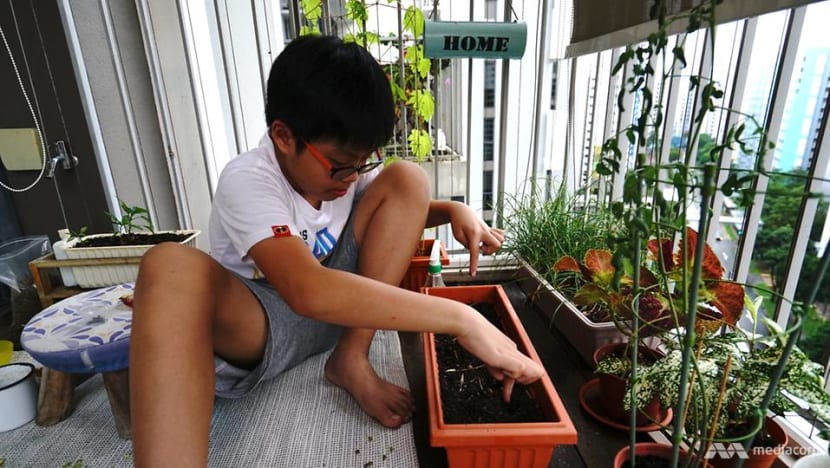
Valen Ng, 12, got into gardening two years ago after a teacher gave him a green bean plant to grow at home. (Photo: Rachel Phua)
SINGAPORE: Valen Ng is having the time of his life in his own backyard.
It’s more of a 2m by 1m balcony, but it’s where the 12-year-old can spend hours every day, cutting up dried leaves and leftover broccoli, gingerly laying seeds inside dimpled layers of soil, pruning his chilli, bittergourd, kangkong and tomato plants.
“I try to grow plants that I can eat because don’t need to go outside and buy,” the shy but excitable boy said. It is one of the ways he tries to help his family save money and reduce packaging waste.
He is also the first to grab the toilet roll tube and put it in the recycling bag. He reminds his parents to bring their own containers when they go out to buy food, and even saves his parents’ receipts in a box so he can use them as bookmarks.
“He’s like a karang guni man,” Valen’s mum, Madam Kuan Suan Shi, joked.
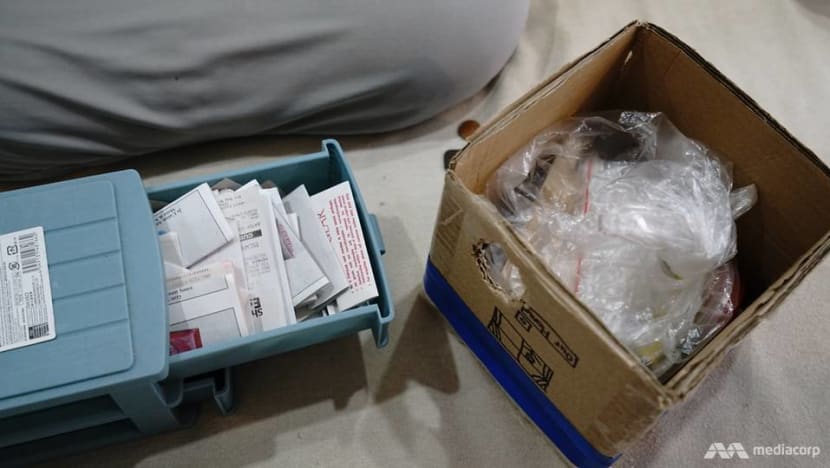
Valen’s interest in nature started five years ago when Mdm Kuan, a teacher, transferred to Lianhua Primary School. The school’s citizenship and character education department often organised environment-centric activities like food compost, gardening and marine conservation workshops. She would bring Valen along, getting their hands dirty by sticking them in soil or picking litter at the beach.
They would bring the ideas they learnt from these sessions back home. Valen started a recycling corner in the kitchen and turned used Yakult bottles and cardboard boxes into race tracks for his marbles.
When he was Primary 4, a teacher gave him and his classmates each a green bean plant to grow, as a science experiment. Valen nurtured it carefully, and his family had a mini harvest. He was hooked.
“I want to be a gardener,” he declared buoyantly when asked what he wants to be when he grows up. His mum is heartened, even if the frequent appearances of lizards and cockroaches get under her skin sometimes. She knows urban farming is an up-and-coming field. Gardening has also helped the boy, who has Attention Deficit Hyperactivity Disorder, calm down.
“(With) more uncertainties and changes in our environment … they are our future and hope in creating a clean and green environment,” Mdm Kuan said, explaining why she encourages her son’s newfound passion.
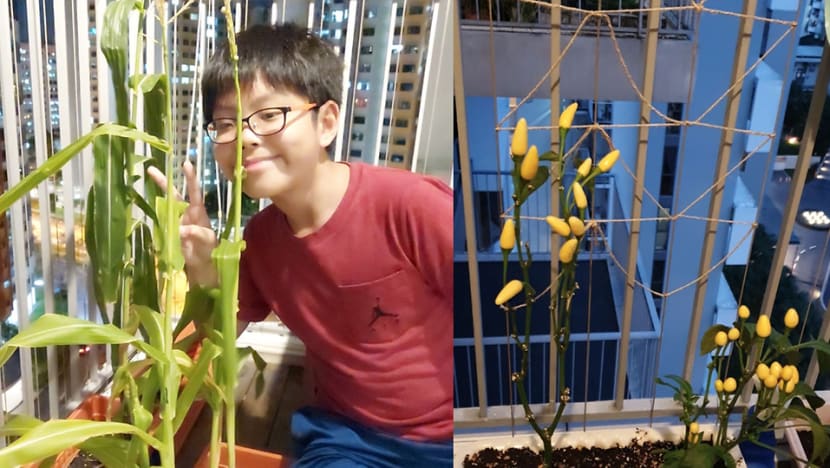
Although young people are thought to be more concerned about environmental issues, it seems it is the adults who are leading the push towards adopting a greener lifestyle - at least at home.
A YouGov Omnibus survey found that 56 per cent of respondents said they were the main person encouraging an eco-friendly lifestyle at home. Another 22 per cent said it was their partner.
Only 8 per cent said it was their child who was taking charge of things, according to the results, which were based on 254 Singaporeans in a household with children aged between five and 17 years old.
But the numbers do not diminish the influence children have on adults, environmentalist Dr Shawn Lum said.
"Children can be very direct (and) they don't cover up stuff," said the senior lecturer at the Nanyang Technological University's Asian School of the Environment.
"It's not just in terms of sheer numbers. But it just takes one or two to be converted by their kids."
As president of the Nature Society Singapore, Dr Lum has seen members who got into bird watching and nature hiking because their children needed someone to accompany them on their newfound hobby.
"And some of them have eventually gone on to become leaders, experts within our birdwatching or nature community," he said.
YouGov's results also showed that most young people care about the environment. When asked to think about the oldest child in the household that is below 18 years old, and how important an eco-friendly lifestyle was to him or her, 89 per cent said it was either extremely or somewhat important.
Valen’s schoolmate Thae Su Shyonlei Nway, or Eda as she is known to her family and friends, said that she grew up in an environmentally-conscious family. They plant fruits and vegetables, make rags out of old clothes, and have saved animals caught in traps and litter while on holiday.
But these days, the 12-year-old is the one reminding her parents to switch the lights off, turn up the air-conditioner temperature, recycle their magazines and plastic bottles, as well as to take along a reusable bag before they go out.
“If we don’t play our part to save the earth, then we will die. And also because of climate change, many animals won’t be able to survive. I love animals. I don’t want that to happen,” she said.
Not that they mind a bit of nagging.
“Actually, we also encourage Eda to understand in this area (of sustainability) also,” said her father Mr Aung Myo Htun. He is glad the school has incorporated lessons about sustainability in its curriculum and taught them habits like composting. The family has started to use vegetable peels and used tea leaves as fertiliser.
Another parent, Dr Mythili Pandi, said she had always been aware of recycling or using sustainable products, but it was her children who pushed her to take it up a notch.
“Every time we go out, it’s like - ‘Have you got a recycling bag?’, ‘Did you bring the Tupperware?’” the mother of three said. “And then it's bubble tea cups and straws. They refuse to buy bubble tea unless you bring the bag.”
When her youngest son, five-year-old Shyam, came home from school one day saying he wanted to bury food scraps in their garden - as he had just attended a class in kindergarten that taught him about food waste - Dr Mythili decided to buy two composting bins to support his idea. Its juices produced “very, very sweet” bananas and papayas a few months ago.
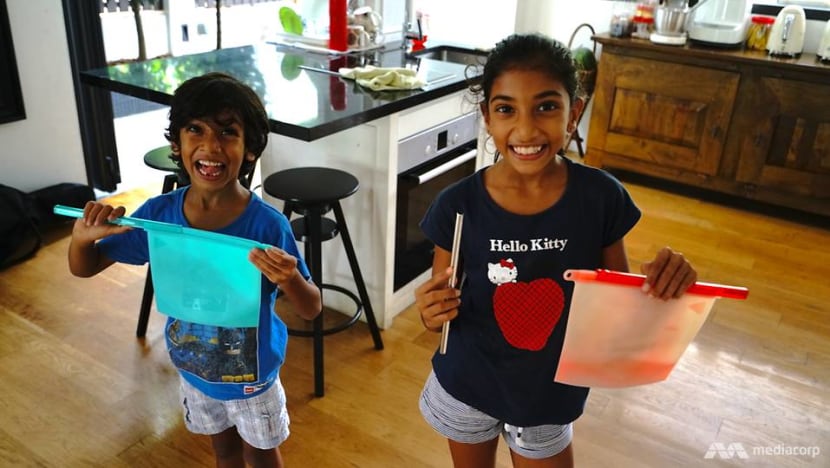
Her children also enjoy going to nurseries, so they can pick out seeds to plant.
“I would have just stuck to buying my vegetables, but now they decided they want to grow their own,” said Dr Mythili, who is a family physician.
Ms Tatiana Siufi and her family pick up litter in their neighbourhood in their spare time. Once, her younger child, four-year-old Natalie, went up to a man who had thrown his cigarette on the ground.
“Can you please stop throwing butts on the ground and start throwing them into the bin?,” Ms Siufi recalled her daughter saying. “It was very brave.”
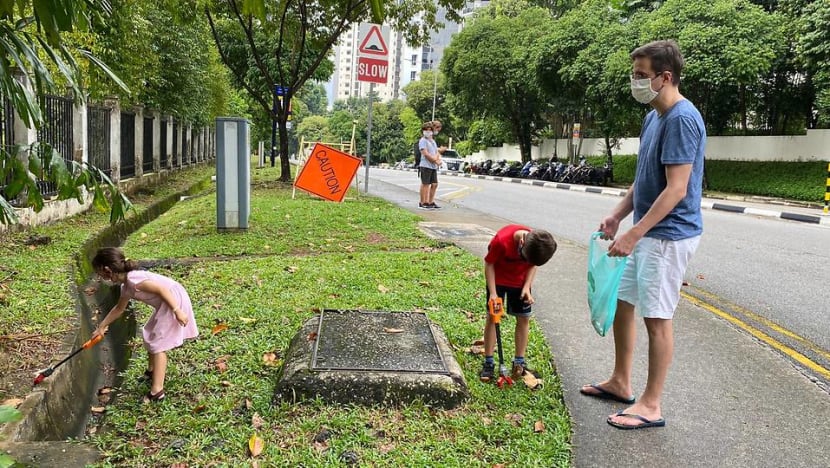
It was a proud moment for Ms Siufi, an events executive at City Sprouts. She is still the eco-czar at home, but it was having children that led her to overhaul her routines.
Her seven-year-old, Raphael, went to a pre-school that emphasised nature-loving and planet-saving. The school got them to garden, compost and understand the concept of the three Rs - reduce, reuse and recycle - and Ms Siufi felt she had to follow suit.
“I would be contradicting what the school taught if I didn’t change,” she said, adding that examples of her family going green include shopping at zero-waste stores, hosting birthday parties and playdates using only reusable items and using rechargeable batteries.
Mdm Kuan agreed. “As adults, we’re easily lured into convenience," she said.
“When we teach the kids one way but as adults we act another way, not putting our knowledge into action, that’s not right,” she added. “I don’t want to kill their excitement about the environment. We need to walk the talk.”














